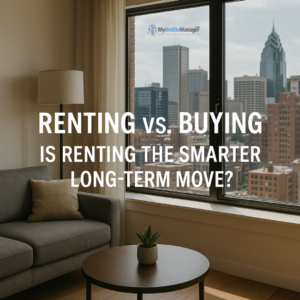For years, buying a home has been viewed as a hallmark of financial success. It’s been deeply rooted in the American Dream own property, build equity, and enjoy long-term security. But recent research suggests that renting may not only be a more practical choice for many people today it could also be the smarter financial move over the long run.
The Financial Gap: Renting May Save You Hundreds of Thousands
According to Taelor Candiloro of This Old House Research, when comparing the total costs of renting and owning over a 30-year period, renters spend an average of $1.42 million while homeowners pay roughly $1.8 million. That’s a substantial difference of $380,000 — about 27% more for homeowners.
These figures include more than just monthly payments they factor in all the related expenses of homeownership, such as:
-
Property taxes
-
Home insurance
-
Maintenance and repairs
-
Interest paid on mortgages
-
Unexpected emergencies (e.g. broken HVAC systems, roof repairs, plumbing issues)
While homeowners may argue that they are building equity and owning an appreciating asset, these costs can significantly eat into the financial benefits of owning a home, especially in markets where home prices plateau or grow slowly.
Stability vs. Flexibility: The Role of Lifestyle
The question isn’t just about numbers it’s also about lifestyle and stability. If you’re planning to stay in one place for 10 or more years, purchasing a home could still make financial sense. The longer you own a property, the more you benefit from home appreciation and equity growth, assuming the market cooperates.
However, for many people especially younger generations long-term stability isn’t guaranteed. Career changes, family needs, or lifestyle shifts often require flexibility that homeownership doesn’t easily allow. Renting offers:
-
Freedom to relocate for job opportunities
-
No commitment to a single neighborhood or city
-
Ability to “test drive” living in different communities without the long-term risk
The Hidden Costs of Homeownership
Many first-time buyers underestimate the true costs of owning a home. Beyond mortgage payments, buyers must account for:
-
Ongoing maintenance (average of 1-2% of home value annually)
-
Unexpected large repairs (roof, plumbing, foundation)
-
Rising property taxes
-
Homeowners association (HOA) fees in some communities
-
Rising home insurance premiums
These recurring and sometimes unpredictable expenses can strain homeowners, especially during economic downturns or periods of personal financial hardship.
The Case for Renting
While renting often gets a bad reputation for being “throwing money away,” experts are challenging this narrative. Renting offers:
-
Predictable Monthly Expenses: You know exactly how much you owe each month, making it easier to budget.
-
No Maintenance Responsibilities: The landlord typically handles repairs and upkeep.
-
Lower Upfront Costs: Renters avoid large down payments, closing costs, and property taxes.
-
More Liquidity: Renters have the freedom to invest their money elsewhere (stocks, retirement, or other ventures).
For many, these advantages outweigh the perceived benefits of ownership especially when property values are uncertain, interest rates are high, or if job mobility is a priority.
The Bottom Line: It’s Personal
Ultimately, the decision to rent or buy isn’t one-size-fits-all. It depends on:
-
How long you plan to stay in one location
-
Your career and lifestyle flexibility
-
Your financial situation and investment goals
-
Local real estate market conditions
In today’s complex housing market, renting is becoming a legitimate and often financially advantageous long-term strategy for many Americans.
Source: Many experts find renting may be a better long‑term choice – FOX 8, June 10, 2025

